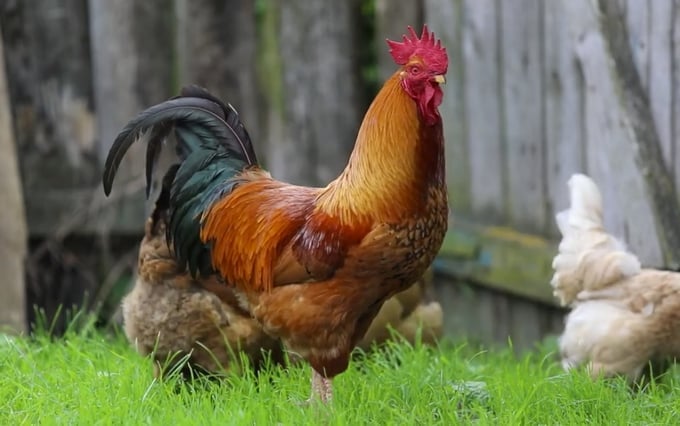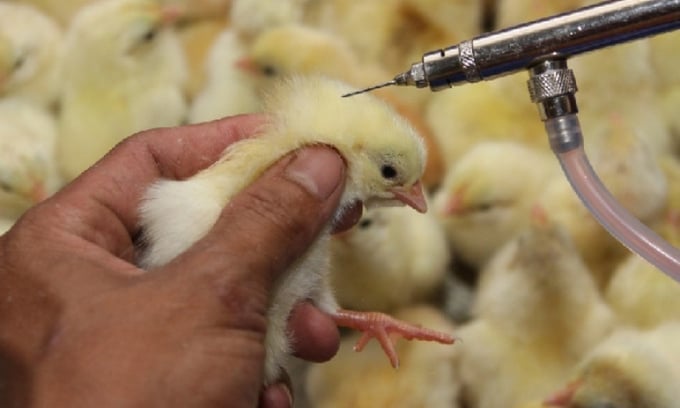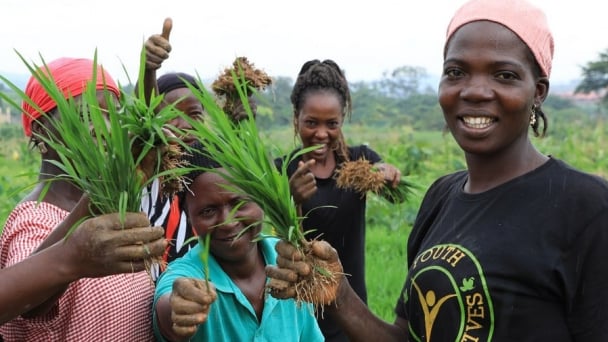May 15, 2025 | 08:15 GMT +7
May 15, 2025 | 08:15 GMT +7
Hotline: 0913.378.918
May 15, 2025 | 08:15 GMT +7
Hotline: 0913.378.918

Greenvet successfully produced a key vaccine set to help farmers proactively prevent Newcastle, influenza, and Gumboro diseases in poultry. Photo: PT.
Biosecurity and disease control measures are the current focus of modern and industrial livestock development trends. Among these measures, the administration of vaccines to protect livestock from dangerous diseases has been emphasized as a priority task.
Established in 2001, Vietnam Greenvet Joint Stock Company has gradually perfected a key vaccine set aimed at promoting "green technology for clean food." The vaccine allows farmers to proactively prevent Newcastle, influenza, and Gumboro diseases in poultry, with the aim of protecting flock health and minimizing losses.
Greenvet, a notable company among many competitors in the vaccine market for livestock, poultry, and pets, is responsible for distributing over 80 different vaccine products. Moreover, the company is a direct distributor of reputable vaccine manufacturers from Indonesia, the Czech Republic, Argentina, and others.
The Medivac ND G7 Emulsion vaccine is the highlight within Greenvet's set of poultry vaccine products. This inactivated vaccine contains the highly pathogenic Genotype VII (G7) strain of the Newcastle disease virus, offering effective prevention against Newcastle disease in poultry.
Vietnamese poultry farmers were unfamiliar with the practice of vaccination in the years between the late 1990s and the early 2000s. Subsequently, several foreign businesses investing in Vietnam had provided instructions on vaccine usage; however, these instructions were tailored mainly to industrial white-feathered chicken breeds with a 42-day rearing cycle. On the other hand, indigenous Vietnamese chicken breeds required a longer rearing cycle ranging from 90 to 120 days.
Only one to two doses of live vaccine, administered through eye drops, nasal drops, or orally, were required for the disease prevention process in white-feathered chickens. At the time, Vietnam lacked standardized protocols for rearing indigenous chickens or free-range colored feather chickens. Notably, the vaccination schedule for white-feathered chickens was adapted for colored feather chickens.
The white-feathered chicken vaccination process, when applied to indigenous chickens, inadvertently created an immune gap for adult chickens over 70 days old. During this stage, the antibody levels from the initial two doses of live vaccine dropped significantly, leaving the flock vulnerable to disease outbreaks, and causing significant losses to farmers. Furthermore, the use of inactivated vaccines for broiler chickens was unprecedented at the time.
In response to these challenges and the immune gap, Greenvet collaborated with Medion Company (Indonesia), and discovered that inactivated vaccines are the only solution for indigenous chickens. Inactivated vaccines are capable of providing high immune response and extended immunity. Consequently, administering a dose of inactivated vaccine between 21 and 35 days of age ensures continued protection until the chickens reach market age.

The Medivac ND G7 Emulsion vaccine, manufactured by Medion Company in Indonesia and distributed by Greenvet in Vietnam, has paved the way for Newcastle disease prevention in indigenous poultry flocks. Photo: PT.
Vietnam has previously utilized an inactivated Newcastle vaccine of the Lasota strain (Genotype II). However, the Department of Animal Health and the National Center for Veterinary Diagnosis conducted research, collected Newcastle disease samples from outbreak areas, and performed molecular biology tests between 2012 and 2023. Subsequently, they announced that the primary virus strain causing outbreaks was the highly pathogenic Genotype VII.
On the other hand, the traditional Lasota strain Newcastle vaccine provides limited cross-protection against this highly pathogenic G7 strain. In response to the progress of disease outbreaks, Greenvet proposed to its partner, Medion Indonesia, to manufacture a vaccine suitable for the G7 Newcastle strain in Vietnam. As a result, inactivated Newcastle vaccines containing the G7 virus strain were developed and introduced.
Greenvet has organized multiple seminars and conferences to educate and encourage farmers to adopt new vaccination procedures. These efforts have led to high vaccination rates and effectiveness among livestock farms.
Manufactured by Medion Indonesia, the Medivac ND G7 Emulsion vaccine contains antigens from the G7 Newcastle variant, providing effective immunity against both old and new highly pathogenic strains. The vaccine induces a strong and long-lasting antibody response, which is suitable for indigenous Vietnamese chicken breeds with long rearing cycle.
Notably, this vaccine technology eliminates harmful agents that cause shock to animals. As a result, the Medivac ND G7 Emulsion vaccine, featuring near-perfect safety, has been adopted in numerous European countries.
Greenvet's other contributions to the prevention and control of livestock diseases include the Medivac AI avian influenza vaccine, which provides protection against highly pathogenic avian influenza strains in Vietnam.
With its modern testing system, Greenvet was able to detect mutations in the avian influenza virus. Consequently, Greenvet is actively raising awareness among poultry farmers and farm owners regarding the impact of highly pathogenic avian influenza viruses H5 and low pathogenic H9 on poultry health and productivity.
Greenvet relies on epidemiological research results and genetic sequence analysis conducted at its laboratory to select vaccine branches suitable for avian influenza viruses circulating in Vietnam. Additionally, the company's laboratory assists farm owners in testing the antibody titers of their poultry flocks, either routinely or post-vaccination.
The Medivac AI influenza vaccine is regularly subjected to rigorous testing by the Department of Animal Health, with recognized effectiveness rates of at least 80 to 90% against circulating highly pathogenic influenza strains after a single vaccination. Major livestock businesses and farms are currently utilizing Greenvet's Medivac AI influenza vaccine.

Greenvet is actively raising awareness among poultry farmers and farm owners regarding the impact of highly pathogenic avian influenza viruses H5 and low pathogenic H9. Photo: PT.
For nearly twenty years, farmers have associated Gumboro (infectious bursal disease) vaccines with Gum A - a strong strain, and Gum B - a medium strain. These are the names of the Medivac Gumboro A and Medivac Gumboro B vaccines produced by Medion Indonesia and distributed by Greenvet in Vietnam.
The extensive level of adoption reflects farmers' trust in the exceptional quality of the Medivac Gumboro vaccine products. These vaccines are tailored to the Gumboro virus strains prevalent in Vietnam, as confirmed by independent university research.
The effectiveness of the Medivac Gumboro A vaccine has been tested by scientists from the Faculty of Agriculture and Biology at Can Tho University, Tra Vinh province's Sub-Department of Agriculture and Aquaculture Quality Management, and Dong Thap Vocational College, in a collaborative effort spanning from 2015 to 2016.
The results indicated that the amino acid similarity between the circulating virus strain and the Medivac Gumboro A vaccine virus sample was 97.9%. In comparison, the similarity with other vaccine viruses was 95.2%, 91.8%, and 90.4%. Consequently, the Medivac Gumboro A vaccine provides a significantly higher level of protection.
In addition to the three flagship key vaccines for poultry disease prevention, Greenvet has researched and introduced several other vaccines to the market. This initiative provides farmers with access to a wide range of effective vaccine products, tailored to real-world conditions.
Other notable vaccines include: Medivac AE-POX vaccine for viral encephalomyelitis (AE) and fowlpox disease; Medivac Coryza B vaccine, an inactivated vaccine for Coryza in poultry; Medivac IB H-120 vaccine, live freeze-dried vaccine for infectious bronchitis; ND Lasota vaccine for Newcastle disease strain Lasota in poultry; among many others.
Moving forward, the technical team at Greenvet will continue their efforts in researching and applying bio-products to deliver high efficacy in livestock and poultry farming.
By the end of the first quarter of 2024, the poultry population in Vietnam has reached 560 million, marking an increase of approximately 2.1%. The estimated yield of poultry meat reached nearly 594,000 tons, marking an increase of 5.1%; and the estimated yield of poultry eggs reached 5 billion eggs, marking an increase of 4.8%. These results have demonstrated the positive contribution of vaccines in disease prevention, and maintaining the safety of poultry amidst diverse farming conditions.
Translated by Nguyen Hai Long

(VAN) Data from 10,000 farming households will help professionalize production organization and support the implementation of the One Million Hectares Program for High-Quality, Low-Emission Rice Cultivation.

(VAN) FAO Director-General QU Dongyu marks International Day of Plant Health at NENA conference.

(VAN) Deputy Minister of Agriculture and Environment Hoang Trung affirmed that floriculture and ornamental plants are a growing industry that receives significant global attention.

(VAN) The three staple crops dominating modern diets – corn, rice and wheat – are familiar to Americans. However, fourth place is held by a dark horse: cassava.
/2025/05/10/4037-3-223011_495.jpg)
(VAN) Remote sensing technology is becoming an indispensable tool in monitoring resources, developing modern agriculture, and protecting the environment in Vietnam.

(VAN) The trash bag used on fishing vessels can withstand rough sea conditions, including level 8 to level 10 winds and waves. Notably, it can be hung anywhere on the boat.

(VAN) African leaders launched the Kampala Declaration on Building Resilient and Sustainable Agrifood Systems in Africa, marking a bold step toward transforming the continent's agriculture.